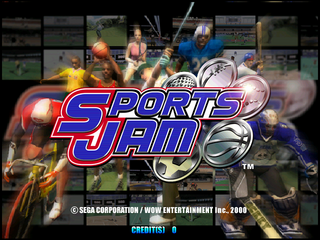Difference between revisions of "Sports Jam"
From Sega Retro
| Line 99: | Line 99: | ||
==Technical information== | ==Technical information== | ||
| − | The announcer's character model consists of 18,357 polygons, including 17,183 polygons for the body and 1174 polygons for the shadow.{{ref|[http://i1056.photobucket.com/albums/t366/Esppiral/Dreamcast%20polycount/wire-con-sombra_zpse98c8443.jpg~original Character model with shadow]}}{{ref|[http://i1056.photobucket.com/albums/t366/Esppiral/Dreamcast%20polycount/wire-sin-sombra_zpsbb543ab8.jpg~original Character model]}} This was the highest character polygon count in any video game at the time, up until it was surpassed the following year by ''[[Virtua Fighter 4]]'' (on the [[Sega NAOMI 2]] [[arcade]] system), which had about 20,000 polygons per character.{{ref|[https://game.watch.impress.co.jp/docs/20061025/3dvf5.htm 3Dゲームファンのための「バーチャファイター5」グラフィックス講座]}} | + | The announcer's character model consists of 18,357 polygons, including 17,183 polygons for the body and 1174 polygons for the shadow.{{ref|[http://i1056.photobucket.com/albums/t366/Esppiral/Dreamcast%20polycount/wire-con-sombra_zpse98c8443.jpg~original Character model with shadow]}}{{ref|[http://i1056.photobucket.com/albums/t366/Esppiral/Dreamcast%20polycount/wire-sin-sombra_zpsbb543ab8.jpg~original Character model]}} This was the highest character polygon count in any video game at the time, up until it was surpassed the following year by ''[[Virtua Fighter 4]]'' (on the [[Sega NAOMI 2]] [[arcade]] system), which had about 20,000 polygons per character.{{ref|[https://game.watch.impress.co.jp/docs/20061025/3dvf5.htm 3Dゲームファンのための「バーチャファイター5」グラフィックス講座]}} It was also higher than the character polygon counts of any [[PlayStation 2]] or [[Xbox]] games (up to 15,000 polygons in [[:Category:Dead or Alive|''Dead or Alive 3'' and ''Dead or Alive Ultimate'']] on the Xbox).{{ref|[https://forum.beyond3d.com/threads/yes-but-how-many-polygons-an-artist-blog-entry-with-interesting-numbers.39321/ "Yes, but how many polygons?" An artist blog entry with interesting numbers]}} |
==External links== | ==External links== | ||
Revision as of 02:32, 28 May 2019
| Sports Jam | |||||||||||||||||||
|---|---|---|---|---|---|---|---|---|---|---|---|---|---|---|---|---|---|---|---|
| System(s): Sega NAOMI, Sega Dreamcast | |||||||||||||||||||
| Publisher: Sega (JP), Agetec (US) | |||||||||||||||||||
| Developer: WOW Entertainment | |||||||||||||||||||
| Peripherals supported: Dreamcast Arcade Stick, Jump Pack, Dreamcast Modem, Visual Memory Unit, Dreamcast VGA Box | |||||||||||||||||||
| Genre: Sports | |||||||||||||||||||
| Number of players: 1-2 | |||||||||||||||||||
| |||||||||||||||||||
This short article is in need of work. You can help Sega Retro by adding to it.
Sports Jam (スポーツ・ジャム) is a Sega Dreamcast and Sega NAOMI release containing a number of sports games.
Contents
Production credits
- Executive Producer: Rikiya Nakagawa
- Producer: Kenichi Imaeda
- Director: Yasutake Nakayama
Dreamcast Version
- Design Section: Taku Makino, Toshihiro Ando
- Soft Section: Akira Wada, Motoyoshi Sato, Hiroshi Ando
- Network: Tatsuya Watanabe, Niromi Tanaka
- Sound Section: Nanae Kenda, Susumu Tsukagoshi
- Publicity Section: Mizuki Marui, Noriko Yamada, Takuya Tsunomura
- Manual And Package Design: Toshihiro Ando, Osamu Nakazato (Sega), Naohico Iida (Sega)
Naomi Version
- Design Section: Taku Makino, Akira Miyanishi, Satoshi Nakajima, Toshihiro Ando, Shien Kato, Yasuhito Kuroiwa, Ryodo Tanaka, Toshihiro Fujimaki
- Soft Section: Hiroshi Ando, Akira Wada, Gen Miyazaki, Motoyoshi Sato
- Sound Section: Nanae Kenda
- Cabinet Design: Hiroyuki Naitoh (Sega)
- Special Thanks: Kaori Fukano, Sega Thunderbolt, Shinjuku Sports Land, All Players of Sports Jam, Swatch, adidas
- Created by: WOW Entertainment
- Presented by: Sega
- ©Wow Entertainment/Sega 2000,2001
Magazine articles
- Main article: Sports Jam/Magazine articles.
Promotional material
Print advert in Dreamcast Magazine (JP) #2001-12: "2001-12 (2001-04-27,05-04)" (2001-04-13)
Physical scans
NAOMI version
Dreamcast version
| Sega Retro Average | ||||||||||||||||||||||||||||||||||||||||||||||||||||||||||||||||
|---|---|---|---|---|---|---|---|---|---|---|---|---|---|---|---|---|---|---|---|---|---|---|---|---|---|---|---|---|---|---|---|---|---|---|---|---|---|---|---|---|---|---|---|---|---|---|---|---|---|---|---|---|---|---|---|---|---|---|---|---|---|---|---|---|
|
| 73 | |
|---|---|
| Based on 12 reviews | |
Technical information
The announcer's character model consists of 18,357 polygons, including 17,183 polygons for the body and 1174 polygons for the shadow.[14][15] This was the highest character polygon count in any video game at the time, up until it was surpassed the following year by Virtua Fighter 4 (on the Sega NAOMI 2 arcade system), which had about 20,000 polygons per character.[16] It was also higher than the character polygon counts of any PlayStation 2 or Xbox games (up to 15,000 polygons in Dead or Alive 3 and Dead or Alive Ultimate on the Xbox).[17]
External links
- Sega of Japan catalogue pages (Japanese): Dreamcast
References
- ↑ http://sega.jp/dc/010411/
- ↑ 2.0 2.1 File:Dorimaga JP 20021011 2002-18.pdf, page 34 Cite error: Invalid
<ref>tag; name ":File:Dorimaga JP 20021011 2002-18.pdf_p34" defined multiple times with different content - ↑ 576 Konzol, "Május 2001" (HU; 2001-xx-xx), page 43
- ↑ Ação Games, "Setembro 2001" (BR; 2001-xx-xx), page 46
- ↑ Consoles +, "Juin 2001" (FR; 2001-0x-xx), page 90
- ↑ Dreamcast Magazine, "No. 24" (UK; 2001-07-12), page 60
- ↑ Dreamzone, "Mai 2001" (FR; 2001-0x-xx), page 44
- ↑ Edge, "August 2001" (UK; 2001-07-13), page 100
- ↑ Electronic Gaming Monthly, "August 2001" (US; 2001-07-03), page 111
- ↑ Famitsu, "2001-04-20" (JP; 2001-04-06), page 32
- ↑ Game Informer, "August 2001" (US; 2001-0x-xx), page 106
- ↑ MAN!AC, "06/2001" (DE; 2001-05-02), page 50
- ↑ PSX Extreme, "09/2001" (PL; 2001-0x-xx), page 57
- ↑ Character model with shadow
- ↑ Character model
- ↑ 3Dゲームファンのための「バーチャファイター5」グラフィックス講座
- ↑ "Yes, but how many polygons?" An artist blog entry with interesting numbers
Categories:
- Pages with reference errors
- Dreamcast Arcade Stick-compatible games
- Jump Pack-compatible games
- Dreamcast Modem-compatible games
- Dreamcast VGA Box-compatible games
- Visual Memory Unit-compatible games
- 1-2 player games
- All arcade games
- NAOMI GD-ROM games
- 2000 NAOMI GD-ROM games
- All 2000 games
- Arcade sports games
- All sports games
- JP Dreamcast games
- All JP games
- US Dreamcast games
- All US games
- Dreamcast games
- 2001 Dreamcast games
- All 2001 games
- Dreamcast sports games
- Old content rating field
- All games
- Stubs
- Credits without reference
- GalleryPrintAd file defined
- Old-style rating (consolesplus)
- Rating without PDF source
- Old-style rating (edge)
- Old-style rating (famitsu)
- Old-style rating (dmjp r)
- Use magref
- Update ratings template
- 4 old ratings








